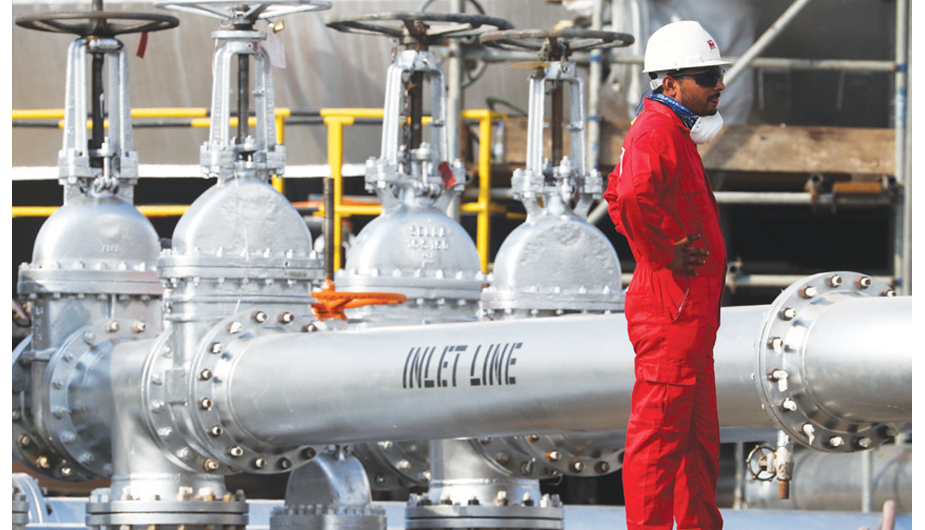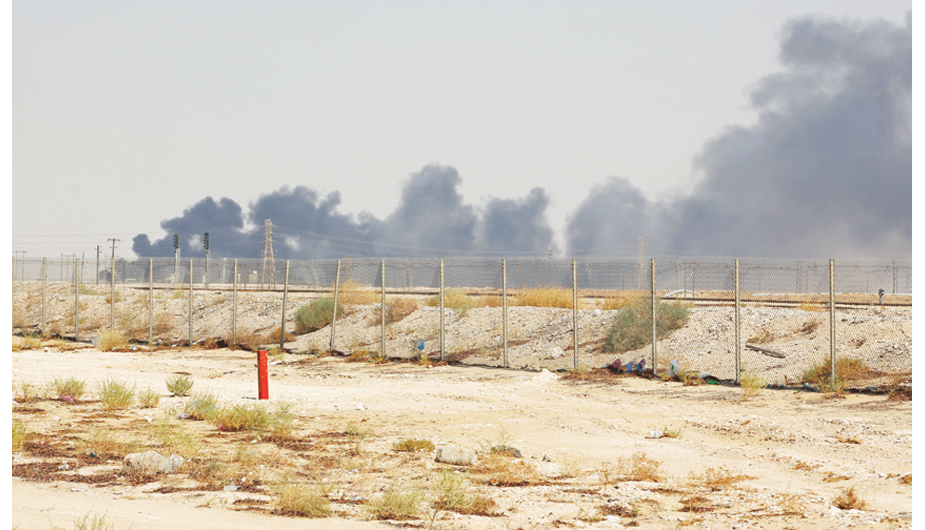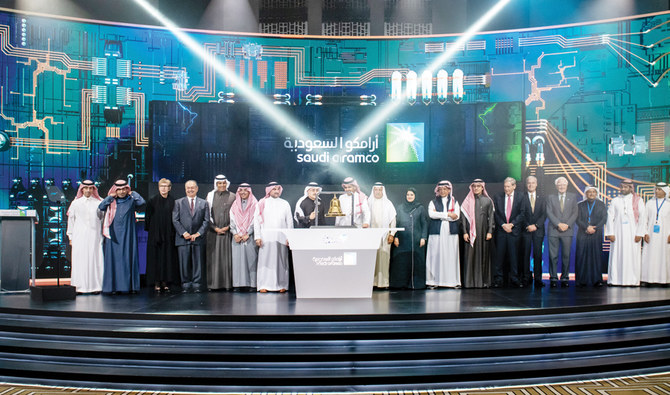DUBAI: On Dec. 11, Yasir Al-Rumayyan and Amin Nasser — chairman and chief executive respectively of Saudi Aramco — rang the opening bell at the Tadawul stock exchange in Riyadh in a shower of ticker-tape, and the Kingdom’s business and economic scene was changed forever.
Al-Rumayyan, who had pushed through the initial public offering (IPO) of shares in the face of some opposition from Western financial advisers, spoke of a “proud and historic moment” as he described the event as a “milestone” on the Vision 2030 path to the Saudi economy’s diversification away from oil dependency.
Others thought the IPO’s true significance was even more profound. Ali Shihabi, well-known commentator on Saudi affairs, said the offering was a “monumental development” as part of the “cultural shock therapy” under way in the Kingdom, under the guidance of a new generation of reformist policymakers led by Crown Prince Mohammed bin Salman.
The IPO has instantly given Saudi Aramco the status of the world’s most valuable company, made the Kingdom’s ambitious sovereign wealth fund, the Public Investment Fund, richer by roughly $30 billion, and catapulted Tadawul into the top flight of global stock exchanges.
But, perhaps more significant, it is also the first stage in a process that could see further sales of Aramco shares, with a listing on a foreign stock exchange a distinct possibility in the near future.
On top of the hugely oversubscribed $12 billion bond Aramco issued earlier in the year, the IPO has given Saudi Arabia a certain cachet in the international capital markets and the self-confidence to play a global role in the financial world.
It is also likely to accelerate the Kingdom’s eastward tilt, away from the big financial centers of New York and London and towards the growing Asian hubs, such as Tokyo and Hong Kong.
One executive for an Asian finance house in the Middle East, who did not wish to be named, said: “Some people say floating a small percentage will make no difference, but that misses the point. Aramco has signed up to Tadawul’s standards of transparency and accountability, and no other national oil company has to obey stock market rules like that.”
The opening ceremony was the culmination of a process that began in late 2016, when the crown prince stunned the world with the news that he was considering a stock market flotation for the biggest oil exporter in the world.

A Saudi Aramco oil processing facility in the Eastern Province. The company’s IPO is likely to accelerate the Kingdom’s eastward tilt, away from the big financial centers of New York and London and towards the growing Asian hubs, such as Tokyo and Hong Kong. (Getty Images)
Back then, it was suggested around 5 percent of Aramco might be sold, that the company could be valued at $2 trillion, and that the IPO would happen pretty quickly.
Those plans evolved and adapted to changing circumstance. Last year, at the World Economic Forum annual meeting in Davos, Nasser told Arab News that the biggest single reason for the delay in the IPO was the desire to strengthen Aramco’s position in the booming downstream petrochemicals sector with the acquisition of SABIC.
That deal went through early last year, removing the last strategic obstacle to the IPO.
The valuation had been a matter of debate ever since the IPO plans were first announced.
Seasoned observers of the financial markets agree that there is nothing unusual about a difference of opinion between the vendor (the government of Saudi Arabia in this case) and potential buyers (the international investment community).
Both are looking to maximize their return on the deal.
With a company as big and strategically significant as Aramco, other factors inevitably came into play during the complex negotiations between the government and its advisers.
The oil price — inevitably a big element in determining Aramco profitability and therefore valuation — was under pressure throughout the IPO planning stage as American shale flooded global markets.
As a leading member of OPEC, the Kingdom took action, in partnership with Russia and other non-OPEC oil producers, to stabilize the price.
FASTFACT
6x - Consulting firm Thunder Said Energy found Saudi Aramco to be six times more efficient than ExxonMobil and Chevron in both current emissions and targets for future reduction as a proportion of its gas production.
Then, just as details were being finalized for the publication of the IPO prospectus — the crucial document on which the valuation is assessed — the risks of doing business in the Middle East were thrown into stark relief with the Iranian attacks on Aramco facilities at Abqaiq and Khurais.
With “geopolitical risk” on top of analysts’ minds, another negative had been thrown into the valuation process, despite Aramco’s rapid recovery from the attacks, which had the potential to dramatically alter the IPO arithmetic in turbulent global energy markets.
The whole pricing process was also conducted against the backdrop of a changing investors attitude to “Big Oil” companies as the debate intensified about the best way to tackle climate change.
Despite being the biggest exporter of fossil fuel in the world, Aramco has strong credentials in the environment lobby, with low levels of pollutants from its production and refining processes and a high level of investment in new, anti-polluting technology.
Another factor cited as a headwind when the shares were being priced was Western reaction to the murder of journalist Jamal Khashoggi the previous year, though this had not prevented investors in New York and London from subscribing to the Aramco bond a few months earlier.
By mid-November, when the final decision on pricing had to be taken, there was a huge range in the valuations as assessed by the small army of international and regional financial institutions advising on the IPO.
At a fractious meeting in Riyadh, one banker was reported as saying “there is real tension in the banking syndicate.”
Al-Rumayyan cut through the dissent with a simple formula: The IPO would not be marketed in Western financial centers like London and New York, and would instead focus on Saudi and regional investors.
The Westerners had been the leading advocates of a lower valuation, and Aramco advisers explained that there was little sense in marketing to them when they had been dragging their feet on the valuation.
In any case, ample provision had been made for foreign investors to take up shares in the IPO via the Tadawul.
That logic turned out to be amply justified. At a compromise valuation of around $1.7 trillion, there was more than enough demand in the region when the share sale was finally launched.
The offer was nearly five times oversubscribed in total, implying that more than $100 billion of demand was chasing only $26 billion worth of shares.
Among Saudi investors, there was big demand for the flagship offering. Some 5 million citizens and expat residents bought shares in the offering to become equity partners in the company that has been at the heart of the Kingdom’s prosperity for more than 80 years.
They can look forward to a healthy dividend stream as well as bonus shares if they hold on to their stake for a minimum of six months.
So far, they have had no reason to regret their decision to invest in the world’s most profitable company.
In contrast to many big IPOs in 2019 — like ride-hailing firms Uber and Lyft, not to mention the aborted flotation of WeWork — Aramco shares surged on opening, and soon hit the $2 trillion valuation, allowing the Kingdom to tick another box of the IPO check-list.

Drone attacks in September sparked fires at two Saudi Aramco oil facilities in Abqaiq but they recovered quickly from the attacks. (AFP)
It has since fallen back, but is still above the issue price. Investment bank adviser Goldman Sachs has shares in reserve to smooth out price fluctuations.
With the dividend already set in stone, there are two main, interconnected factors that will determine the share price going forward — Aramco’s underlying level of profitability, and the price of oil on international energy markets.
“If oil prices stay consistently in the $70-$80 range, there will be greater interest in global oil stocks generally,” said the executive of the Middle East-based Asian finance house.
But the OPEC+ limits on production could also affect Aramco profits for the current year, he warned.
“Overseas skepticism about the valuation has not disappeared,” the financier added, implying that the mainly Western banks that tried to talk down the IPO price would not buy shares at current prices.
But in that case, Aramco has another trick up its sleeve. There are plans under discussion to list the shares on an Asian stock market, with Tokyo edging ahead of Hong Kong as the preferred venue. Asian investors are likely to appreciate Aramco’s robust dividend, and are equally keen to ensure strong trading ties with their main supplier of crude oil.
The logic is for Aramco to look further eastwards, away from the skeptical West. “Asia has been Aramco’s primary growth market since the 1990s, when Ali Al-Naimi (former Aramco president and Saudi energy minister) identified it as the largest center for future oil demand,” Ellen Wald, American energy consultant and author of the book Saudi Inc, told Arab News.
“When people notice a so-called ‘move to Asia,’ they are just noticing a decades-old plan.”




















